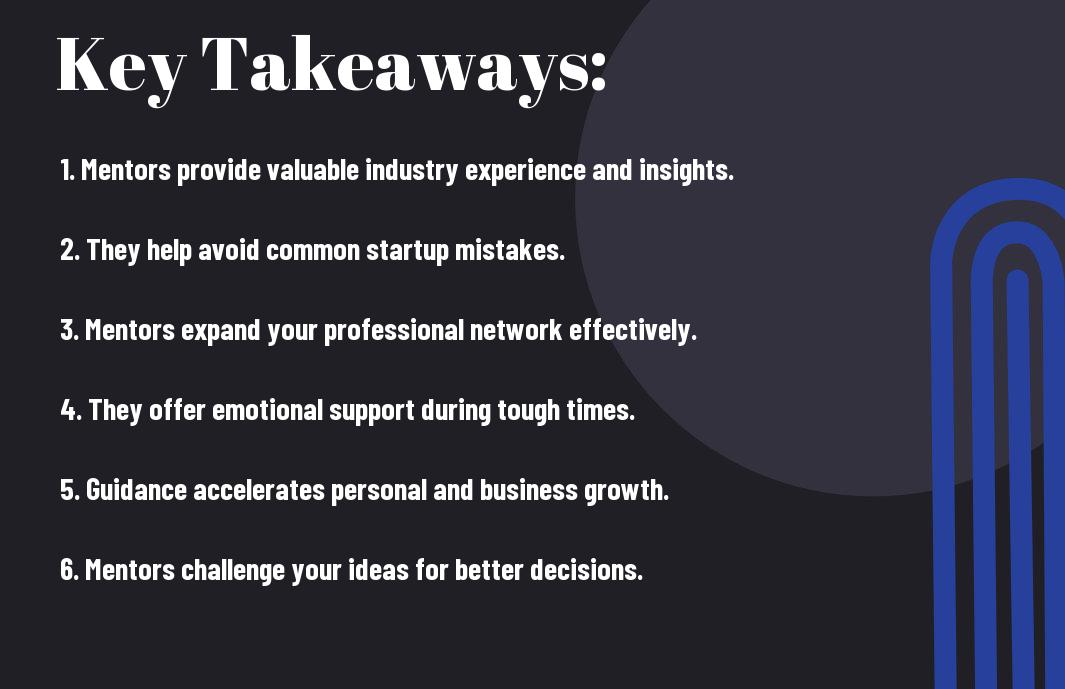
It’s not just a suggestion; having a mentor is one of the most important investments you can make as a founder. I’ve seen firsthand how an experienced mentor can provide you with wisdom, guidance, and an invaluable perspective that can steer your business toward success. Navigating the entrepreneurial landscape can be overwhelming, filled with risks and uncertainties. A mentor not only helps you avoid common pitfalls but also inspires you to reach your full potential. Let’s explore why enlisting a mentor is imperative for every founder’s journey.
Key Takeaways:
- A mentor can provide invaluable industry insights and learning experiences that accelerate the founder’s growth and decision-making process.
- Having a mentor expands a founder’s network, opening doors to new opportunities, partnerships, and resources.
- Mentors offer personalized guidance and support, helping founders navigate challenges and avoid common pitfalls in their entrepreneurial journey.
- The relationship with a mentor encourages accountability and motivation, which can be crucial for maintaining focus and drive.
- A mentor’s outside perspective can help founders stay objective and offer constructive criticism, leading to improved strategies and outcomes.

The Importance of Mentorship
To navigate the turbulent waters of entrepreneurship, you need guidance—this is where mentorship plays a vital role. A mentor is someone with experience who can provide valuable insight, advice, and support tailored to your journey as a founder.
Definition of a Mentor
Mentor refers to an experienced individual who offers guidance, encouragement, and advice to less experienced persons in their field, serving as a trusted advisor throughout their professional development.
The Role of a Mentor in Business
After starting your venture, you’ll quickly realize the importance of a mentor. They provide a sounding board for ideas, assist in navigating challenges, and offer insights from their own experiences.
Hence, a mentor plays an indispensable role by helping you avoid common pitfalls and uncovering opportunities you may not have considered. With their guidance, I have been able to build a strong foundation for my business and develop important decision-making skills. Their expert knowledge can steer you towards making informed decisions and assist in strategic planning, ultimately boosting your chances of success.
Key Traits of an Effective Mentor
By identifying the right mentor, you can enhance your entrepreneurial journey significantly. An effective mentor should possess qualities like experience, patience, and a genuine commitment to your success.
It is imperative to seek a mentor who not only has the relevant industry experience but also exudes empathy and understanding. This relationship should be built on trust and mutual respect, allowing for open dialogue. A mentor who actively listens and challenges you while providing constructive feedback can foster your personal and professional growth, which is vital for any founder looking to thrive in today’s competitive landscape.

Benefits of Having a Mentor
Some of the most significant advantages of having a mentor come from their ability to guide you through the many challenges of entrepreneurship. Their experience can be an invaluable asset that can facilitate your growth and success.
Access to Valuable Experience
Across my journey, I’ve recognized that a mentor brings a wealth of knowledge drawn from past struggles and victories. This experience allows you to learn from their mistakes and avoid the pitfalls that might otherwise derail your progress.
Networking Opportunities
Having a mentor opens doors to a vast network of professionals and other entrepreneurs. This network is invaluable for building relationships that can lead to collaborations, partnerships, and potential investors.
Also, mentors often introduce you to important contacts in your industry, giving you access to opportunities that may not be easily found on your own. These connections can help you grow your business, find advisors, or discover new markets. A mentor’s established relationships can transform your career trajectory in ways you might not anticipate.
Emotional Support and Guidance
The entrepreneurial journey can be intensely isolating, but a mentor provides the emotional support necessary to navigate through tough times. Their reassurance and perspective can help maintain your focus and resilience.
To rely on a mentor during challenging phases can be incredibly reassuring. Their experience can remind you that setbacks are part of the process, and they can offer strategies for coping with the stress that entrepreneurship often brings. Their ability to listen and offer guidance can be a game-changer when you’re feeling overwhelmed.
Accountability and Motivation
About having a mentor, accountability is another key benefit. They can help ensure you’re staying on track with your goals and holding you responsible for your commitments.
Experience has shown me that when I know I have to report back to someone, it drives me to perform at my best. A mentor’s oversight can keep you motivated and remind you of your vision during moments of doubt. This relationship fosters a sense of responsibility that can propel your entrepreneurial efforts forward, significantly increasing your odds of success.
Mentor-Mentee Relationship Dynamics
All successful mentor-mentee relationships thrive on mutual understanding and collaboration. To fully benefit from mentorship, you must navigate the dynamics that shape your connection with your mentor. Each relationship is unique, but some key elements, such as trust, expectation setting, and effective communication, can enhance your engagement and lead to a more fruitful partnership.
Establishing Trust and Respect
Relationship building starts with establishing a solid foundation of trust and respect. Your mentor should feel that you value their insights, while you need to trust their intentions and knowledge. This two-way street is crucial; taking the time to get to know each other breeds a sense of confidence and fosters an environment in which you can comfortably share ideas and concerns.
Setting Clear Expectations
Setting clear expectations is vital for a productive mentor-mentee relationship. Both you and your mentor should discuss what you hope to achieve through the mentorship. This includes defining goals, timelines, and boundaries, ensuring both parties are on the same page regarding their roles and responsibilities.
With a mutual understanding of your goals and expectations, you create a framework that helps steer your discussions and activities. Being open about what you want to achieve, as well as asking your mentor what they expect from you, sets a tone of accountability and creates a focused path forward, reducing potential misunderstandings down the line.
Communicating Effectively
At the heart of every strong mentor-mentee relationship is effective communication. Open, honest conversations allow you to share your thoughts and concerns while also enabling your mentor to provide tailored advice and feedback. Regular check-ins and updates will help both of you stay aligned throughout your journey.
Indeed, you should aim to create an atmosphere where dialogue flows naturally. Encouraging feedback and asking questions are not just beneficial; they are necessary steps to clarify any uncertainties. By fostering a willingness to engage in meaningful conversations, you can ensure that your relationship remains dynamic and responsive to your evolving needs.
Finding the Right Mentor
Despite the vast array of resources available, finding the right mentor is not always straightforward. The ideal mentor will align with your vision, values, and goals, paving the way for significant personal and professional growth.
Identifying Personal and Professional Goals
Any successful mentorship begins with a clear understanding of your personal and professional objectives. Assess what you aim to achieve in both your career and personal life, as this will guide you in selecting a mentor who complements those aspirations.
Exploring Different Mentorship Models
With various mentorship models available, you have the opportunity to choose one that fits your needs best. Options include a traditional, one-on-one mentorship, group mentoring, peer mentoring, or even virtual mentorship networks. Each model offers unique benefits and drawbacks, which you must weigh in line with your goals and preferred style of learning.
Personal preferences and comfort levels play an important role in deciding which mentorship model appeals to you most. One-on-one mentorship allows for deeper connections and personalized guidance, while group settings can provide diverse perspectives and networking opportunities. Investigating virtual mentoring options helps broaden your geographical reach, connecting you with mentors worldwide. Assessing the pros and cons will lead to a well-informed choice.
Tips for Approaching Potential Mentors
By carefully considering how you approach potential mentors, you can make a lasting impression. Here are a few tips to enhance your approach:
- Be clear about your goals before initiating contact.
- Tailor your communication to demonstrate genuine interest in their work.
- Show gratitude for their time and expertise in any interactions.
Thou have the chance to build a meaningful connection through respectful and thoughtful outreach.
Approaching potential mentors can feel daunting, but I believe with the right preparation, you can ease these concerns. Researching your potential mentor’s background is key. Crafting a personalized message, emphasizing shared interests, and focusing on mutual benefit will establish a solid foundation. Be persistent yet respectful; many mentors appreciate a proactive mentee. Additionally, staying open to feedback is important for growth. All in all, your approach can significantly affect the outcome of your mentor-mentee relationship. Thou can find the right match by showcasing genuine enthusiasm and dedication.
Making the Most of Your Mentorship
Unlike many other relationships, a mentorship is a two-way street where both parties can learn and grow. To truly benefit from this relationship, I’ve found that being proactive in how I engage with my mentor is key. This involves preparation, being inquisitive, and being receptive to constructive criticism.
Preparing for Meetings
Across my experiences, I’ve learned that proper preparation is vital for productive mentorship meetings. I always prioritize establishing clear objectives and outlines for our discussions, ensuring I understand what I want to gain from our time together. This will not only help you stay focused but also demonstrate your commitment to making the most of the mentorship.
Asking Thoughtful Questions
About halfway through each mentorship session, I find it helps to ask questions that provoke deeper thought and reflection. Such inquiries can lead to comprehensive insights, guiding both me and my mentor into meaningful discussions about the challenges and opportunities I face.
For instance, instead of simply asking, “What should I do next?” I might rephrase that to, “What are the biggest challenges you see in this path, and how did you navigate similar situations?” This type of questioning not only allows me to tap into my mentor’s experiences but also fosters more engaging dialogues that can lead to valuable lessons learned.
Receiving and Implementing Feedback
For my growth, being open to feedback is a vital part of the mentorship process. I need to actively listen and take their insights seriously, as this can unveil new perspectives I hadn’t considered.
Due to the personal nature of feedback, it’s easy to take criticism as a personal attack. However, viewing feedback as a gift leads to growth. By diligently reflecting on their suggestions and implementing actionable changes in my approach, I not only enhance my skills but also demonstrate to my mentor that I value their guidance, fostering a stronger, more fruitful collaboration.
When to Reevaluate or End a Mentorship
Your mentorship relationship is not set in stone. Periodically, it’s necessary to assess whether the partnership is still beneficial for you and your growth trajectory as a founder.
Signs of a Misaligned Partnership
Between communication breakdowns, differing visions, and unmet expectations, you may notice that the synergy you once shared with your mentor is fading. If your mentor’s advice starts to feel irrelevant or unhelpful, or if you find yourself consistently questioning their insights, these are the red flags that indicate a misaligned partnership.
Transitioning to New Mentors
When you assess that it’s time to shift your mentorship relationship, it’s important to approach the transition with intentionality. Start by identifying what you need from a new mentor. This clarity will guide you in finding someone who better fits your evolving needs as a founder.
At times, you may feel the urge to seek out fresh perspectives and guidance. Transitioning to new mentors doesn’t mean you have to burn bridges. Instead, I suggest openly communicating your decision to your current mentor, expressing gratitude for their support, and outlining your reasons for moving on. This approach not only maintains professionalism but also leaves room for potential future connections.
The Importance of Acknowledgment
At its core, acknowledging the contributions of your mentor is vital. When your journey with them concludes, ensure you express your appreciation for the time and energy they dedicated to your growth.
Signs of a healthy mentorship conclusion involve gratitude and respect. By recognizing your mentor’s impact on your journey, you not only uplift them but also set a tone of positivity for your future relationships. It’s a way to leave the door open for future collaboration or even friendship, creating a network that can benefit you down the road.
Conclusion
Drawing together the insights I’ve gathered, I believe every founder should recognize the significant impact a mentor can have on your entrepreneurial journey. A mentor provides invaluable guidance, accountability, and perspective, enabling you to navigate challenges more effectively. By leveraging their experience, I have seen how you can accelerate your growth, make informed decisions, and develop skills necessary for success. Engaging with a mentor not only enriches your professional life but also fosters personal growth, ensuring you are better equipped to lead your venture towards achieving its full potential.
FAQ
Q: Why is having a mentor important for a founder?
A: A mentor provides insights that can help founders navigate the complexities of building and scaling a business. They have often faced similar challenges and can offer guidance on strategic decisions, financial management, and operational efficiency. By learning from a mentor’s experiences, founders can avoid common pitfalls and accelerate their growth trajectory.
Q: How can a mentor help with networking opportunities?
A: Mentors typically have extensive networks within the industry. They can introduce founders to potential investors, partners, or customers, which can open doors that may otherwise remain closed. These connections can be vital for fostering partnerships and gaining access to resources that are beneficial for business development.
Q: In what ways can a mentor assist with personal and professional development?
A: A mentor can help founders identify their strengths and areas for improvement, facilitating continuous personal and professional development. Through constructive feedback and encouragement, they can help founders build important skills such as leadership, communication, and strategic thinking. This development not only enhances the founder’s capabilities but also positively impacts the entire organization.
Leave a Reply